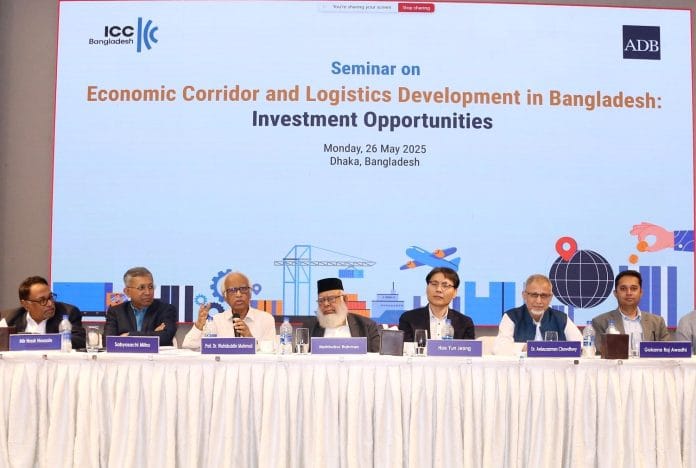Experts and business leaders on Monday called for urgent institutional reforms and increased private investment to fully leverage Bangladesh’s economic corridors as engines of national growth.
They emphasised the need to modernise logistics infrastructure and accelerate corridor development to reshape the country’s economic trajectory and ensure inclusive, regionally balanced progress.
These observations came at a seminar titled “Economic Corridor and Logistics Development in Bangladesh: Investment Opportunities”, jointly organized by the International Chamber of Commerce (ICC) Bangladesh and the Asian Development Bank (ADB), held at a hotel in Dhaka.
Planning Adviser Dr. Wahiduddin Mahmud, attending as Chief Guest, noted that neighboring regions, particularly India’s North-Eastern states, could benefit significantly from Bangladesh’s corridor development, which connects ports and economic zones via rail, road, and waterways.
However, he pointed out that the current interim government cannot initiate new projects, as its development budget is limited to those approved by the previous administration.
ICC Bangladesh President Mahbubur Rahman, who chaired the session, stated that corridor development is now an urgent, evidence-based priority.
Citing projections under a business-induced scenario, he said the region’s combined output could grow from $32 billion in 2020 to $286 billion by 2050, generating up to 71.8 million jobs.
Rahman also stressed the importance of regulatory reforms, digital customs systems, and partnerships with regional and multilateral institutions, particularly the ADB. “ICC Bangladesh stands ready to support this agenda,” he said, underscoring the chamber’s role in linking the private sector with global policymakers.
Dr. Anisuzzaman Chowdhury, Special Assistant at the Ministry of Finance, urged policymakers to prioritize two or three key sectors—such as pharmaceuticals and electronics—to diversify Bangladesh’s export base without delay.
ADB Country Director for Bangladesh, Hoe Yun Jeong, highlighted structural weaknesses in the logistics sector, including overdependence on road transport, congestion, high costs, and limited multimodal infrastructure.
“Solving these challenges is crucial for boosting export-oriented manufacturing,” he said, adding that logistics development must go hand-in-hand with corridor initiatives.
A detailed presentation by Barun Kumar Dey, Senior Economics Officer at ADB, outlined Bangladesh’s growth trajectory and a strategic vision for its future.
Further insights on corridor planning and private sector engagement were shared by Mohammad Nazrul Islam, ADB Senior Transport Specialist, and Sabyasachi Mitra, Senior Logistics and Economic Corridor Expert and former ADB Director for South Asia Regional Development.

